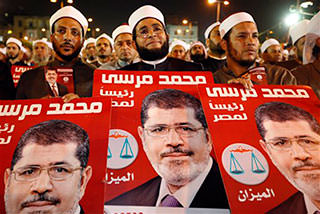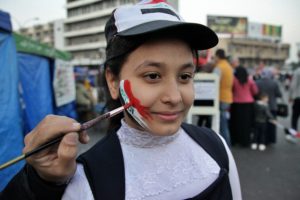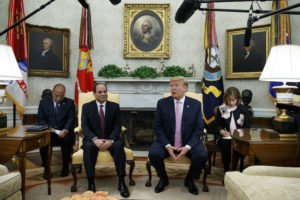Dispatches From Cairo: New President, New Hope
As the days pass, Egyptians seem more and more relaxed, and there is an emerging hope that displays itself in voices less strident, faces less stressed, more smiling, despite the stifling heat. Perhaps the storms of the Arab Spring have finished and now will come the flowering. Voices are less strident, faces less stressed, more smiling, despite the stifling heat. Perhaps the storms of the Arab Spring have finished.
We asked Lauren Unger-Geoffroy, an international artist who lives in Cairo, to share her perspective of life in Egypt after the revolution. In this entry, she writes about Egypt’s reaction to the election of an Islamist as president.
CAIRO — As the days pass, Egyptians seem more and more relaxed, and there is an emerging hope that displays itself in voices less strident, faces less stressed, more smiling, despite the stifling heat. Our mosque singer was inspired today, his dawn call to prayer a lovely aurora. Perhaps the storms of the Arab Spring have finished and now will come the flowering. We dare to hope.
Despite fear-mongering and rumor-spreading, Egypt’s incoming leadership is promising to contradict old preconceptions and carry out groundbreaking initiatives. It is almost surreal that Egypt’s first democratically elected president, the Muslim Brotherhood’s Mohamed Morsi, is a U.S.-educated rocket engineer. (Two of his five children were born in California and are U.S. citizens by birth.)
As is so common across the world, verbal attacks are being directed at the president-elect while the victory celebration is still echoing. The old elite’s well-oiled right-wing propaganda machine and fear of the fundamentalist Muslim Brotherhood have opened the way for knee-jerk predictions of disaster. However, the fresh and unprecedented agenda of Morsi may prove too conciliatory for these ominous projections to take hold among the populace.
The intense suspense that gripped the nation was broken by last weekend’s announcement that Morsi was winner of the presidential election, and now hope for a new day in Egypt is being bolstered by the first gestures of the president-elect.
Countering concerns about potential loss of women’s and Christians’ rights, and following no previous bureaucratic formulas, the Islamist Morsi has promised that a woman and a Christian will be among his vice presidents, and he says he will bring more women into government than before. In addition, he has fulfilled his campaign promise to resign, immediately after the election, from the Freedom and Justice Party and the Muslim Brotherhood, of which he was a chairman.
The promise of a woman VP and more women in public office makes Egyptian liberals and U.S. supporters of women’s rights happy. They might be confused if they juxtaposed this development with the Muslim Brotherhood’s conservative Islamic attitudes about women’s attire, polygamy, the separation of the sexes and similar matters. Many observers do not understand that the MB’s goal is not to take over power from the governments of Egypt and other nations and to enforce belief, but rather to instill a deep social, cultural and personal devotion to Islam through works that will foster faith and submission from the heart. This change begins in the realm of personal life. Regardless of liberals’ judgments about the long-term goals of Islamism, an ailing Egypt has long been waiting for deliverance from any quarter.
The most pressing issues of the disastrously bad infrastructure must be dealt with first. It is the intention of the Brotherhood to restructure Egypt into a fully functioning, modern Islamic nation, one able to take its rightful place on the international stage as the largest Arabic Islamic republic.
The MB says that, winning hearts and minds, it will follow populist policies that directly benefit the masses and bring a higher degree of equality and social justice. Doomsayers are premature in forecasting failure of this experiment, even though it will call for a wide and deep shift in cultural morés.
Morsi has promised significant improvements within the first 100 days of his administration in security, traffic, environmental cleanliness, food availability and the fuel crisis, and has urged the people to provisionally give him their confidence.
Whatever disagreements one may have with the Muslim Brotherhood and its religious values, the Islamists — less corrupt and less motivated by personal gain than the authorities they will replace — can hardly fail to do a better job of managing the economy.
The business acumen of Brotherhood strongman Khairat Shater is demonstrated through the numerous and varied companies he successfully developed for the MB. His managerial genius is largely credited for the incoming government’s strategies of increasing public motivation and of tying promotions to the performance of police officers, public cleaning staffs, bakery workers, fuel inspectors and distributors and others, as well as instigating awareness campaigns through media and Friday prayer speeches concerning the value of cleanliness and cooperation. The Morsi administration is promising an orderly reorganization of many unproductive regulations and strict punishment for dishonesty and lawbreaking.
Among recent surprises is the overturning of the justice minister’s decision to allow military personnel to arrest civilians. In addition, a Supreme Administrative Court verdict on the old regime’s recent constitutional decree denying Morsi access to the governmental sectors of interior, intelligence, media, justice, defense and foreign affairs is tentatively due July 7. Other important pending rulings involve the dissolution of the lower house of Parliament and the panel that was writing a national constitution.
The inauguration is scheduled to take place Sunday. The president-elect normally is sworn in in front of Parliament, but since it has been dissolved by the ruling Supreme Council of the Armed Forces (SCAF), official plans were made to have Morsi take the oath of office in front of the Supreme Constitutional Court. Muslim Brotherhood and allied revolutionary groups claim that Morsi’s taking the oath in front of the court building would give legitimacy to the anti-democracy decisions of the SCAF. As a result, the organizations have been holding a sit-in at Tahrir Square, saying they will not leave until the SCAF decisions on the dissolution of Parliament and presidential powers are reversed.
Forgetting for the moment that the SCAF still controls the nation’s huge, U.S.-armed military, nerves have settled considerably since Sunday’s explosive announcement of Morsi’s election victory. Monday morning saw a slow dispersal of the hundreds of thousands who had been blowing noisemakers, chanting, cheering, singing, drumming, setting off fireworks and celebrating the revolution’s victory in a joyful body-press in Tahrir Square.
My male friends were loath to take me to the demonstration, claiming women shouldn’t go, but they eventually relented. We saw only a few women at Tahrir, veiled and in groups or with their husbands and children.
Unfortunately, in the days that followed there were reports of sexual harassment and of at least one horrific attack on a foreign female journalist. Perhaps these were committed by hirelings of the old regime to discredit the newly elected government.
Of course this is unforgivable savage and inhuman behavior and these feral males must be controlled. If such actions can be addressed by a new social contract under an Islamist government, it will be a great achievement for the MB, and for Egypt.
Hossam was the name of my young taxi driver Monday evening. He had an Egyptian flag covering his automobile’s trunk. I asked him if he was happy about the presidential election outcome. He replied, “Sure.”
I asked him, “So, were you at Tahrir?”
“Yeah, Tahrir.”
“Were you there Sunday for the celebration?”
“Yeah, of course I was at Tahrir. It was amazing. I was there until 5 a.m. There were a million people.”
Then, after a minute, he said, “But [regime candidate Ahmed] Shafiq is better.”
“You like Shafiq?”
“Yeah, Morsi’s OK too, but Shafiq’s better. But it was good it was Morsi. Thanks to God. If Morsi can do a good job, then thanks to God.”
“Yes, really it had to be Morsi,” I said. “If it had been Shafiq there would have been blood and violence.”
“Yeah, that’s true. But we love him [Shafiq] and we like freedom,” the driver said.
“But I guess more people wanted Morsi as president. So he is the winner, and thank God most are happy and nothing is burning! And maybe it will be good. I was so depressed but I am filled with hope now,” I said.
“Yeah, me too. God willing I think he will be good. Why not? I hope so.”
So you went for the victory party.”
“It was to celebrate the president! Democracy!” he said as if it was obvious. And it was.
Your support matters…Independent journalism is under threat and overshadowed by heavily funded mainstream media.
You can help level the playing field. Become a member.
Your tax-deductible contribution keeps us digging beneath the headlines to give you thought-provoking, investigative reporting and analysis that unearths what's really happening- without compromise.
Give today to support our courageous, independent journalists.






You need to be a supporter to comment.
There are currently no responses to this article.
Be the first to respond.